|
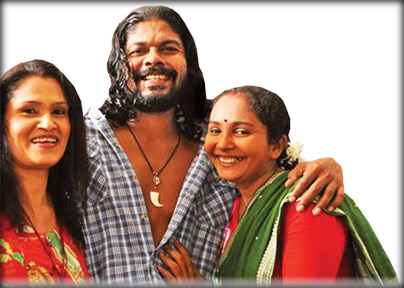 Daasa Mallige Bangalawa and Walking Path: Daasa Mallige Bangalawa and Walking Path:
Two sizzling plays at the Wendt
By Anuradha Kodagoda
The Stage Theatre Group will hold two plays, Daasa Mallige Bangalawa
(The House of Daasa Malli) by Ruwan Malith Peiris and Kalana Jayanath
Gunasekara on July 23 and 24 and Walking Path by Jayampathy Guruge on
July 26 and 27 at the Lionel Wendt Theatre at 7 p.m.
ďFor the past 15 years I have been involved with theatre and this is
the first time that we facilitate to showcase other directorsí work that
we believe as important for the betterment of Sri Lankan theatre.
Therefore, we plan to showcase something old and something new, to
stage two plays that represent the core principles upon which we were
founded, and the ways in which we are evolving. As the name implies,
this run includes the revival of a successful old play, and a new
experimental play,Ē talking to Montage the founder of Stage Theatre
Group and dramatist Ruwanthie de Chikera said.
Ruwanthie de Chikera is a dramatist who has experience in English and
Sinhala theatre and 15 years of hard work has created a solid fan base.
ďAs we have a limited audience for the Sri Lankan theatre it is not
easy to attract newcomers. That is one of the reasons why we decided to
showcase other directorsí plays. Ruwan Malith Peiris and Jayampathy
Guruge are part of the Stage Theatre Group and they had a concrete idea
of what they want to do in theatre.
|
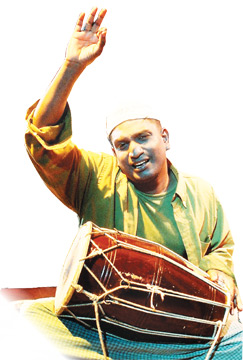
Daasa Mallige Bangalawa |
Therefore, we facilitated them to showcase their theatre productions
and we hope to continue the trend further to bring meaningful theatre
experiences for theatre goers in the country,Ē she said.
Montage interviewed the two directors of the plays.
Excerpts:
Question: How did your debut drama Walking Path materialise?
Answer: Initially itís a concept I gradually developed into a
stage play. As walking paths are the new culture introduced to us
recently as a part of city beautification, itís interesting to observe
and study how people get used to it. I selected a few actors and
actresses at walking paths in Colombo. So, Walking Path is the outcome
of what we have observed and experienced in walking paths of Colombo.
Q: Walking Path is a play without words. Why?
A: Before this play I did another two short plays when I was
at the university and they were also without words. I love to do plays
without words. I think even in life the most complicated emotions can
never be expressed in words.
I strongly believe that when we try to say something in words we
restrict the listenerís imagination and try to deliver a fixed idea
through words.
Through my creations I want to deliver something that I have
experienced and I want to share it with the viewers. This is done
leaving space for their imagination and interpretation. This is not a
miming play and I do not hope to use any miming techniques for Walking
Path.
Sub-culture
Q: Walking paths is the emerging sub-culture in Sri Lanka. It
is accompanied with the culture of exercise, healthy living and
beautification of the city. It can also be identified as an element of a
developed city with cultured people. Are you against this culture?
A: No Iím not. Iím not drawing any conclusions Iím only an
observer. I have used the walking path as a symbol to understand the
emerging sub-culture in Sri Lanka.
|

Ruwanthie de Chikera |
|

Jayampathy Guruge |
How do walking paths reflect human relationships, values and society
in current urban environment? How do human relationships and society, in
turn impact on the sub-culture of the walking paths? What can we learn
about the reality of it, through the existence of the other? These are
the questions that came to my mind when and I tried to find answers
through Walking Path. I hope spectators will agree with the outcome.
Q: Why did you select the theatre as your medium of
expression?
A: I have been engaged with the theatre from my school days.
Iím quite addicted to this medium and I have no life without it. I do
theatre for self satisfaction and I have something to share with the
audience.
Q: Daasa Mallige Bangalawa (the House of Daasa Malli) was
produced in 2004. Are there any changes in the production when you
re-produced it after 10 years?
A: There are a few changes in the script and also in the cast.
But there are no major changes compared to the production in 2004.
Q: Daasa Mallige Bangalawa is an adaptation from the original
Sakkram Binder by Vijaya Tendulkar. What made you to select this play
and do an adaptation as your debut drama?
A: This was a collaboration with my friend Kalana. The main
reason to select the play for an adaptation was the beautiful storyline
of the play and we were really moved by it. Itís not merely a tragi-comedy
but it brings out complicated human relationships in a very subtle
manner.
|
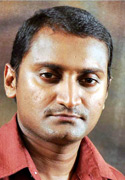
Ruwan Malith Peiris |
|
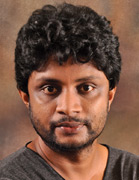
Kalana Gunasekara |
There are a lot of changes in the adaptation from the original play.
For example, the original play is based on a book binder and we adapted
it to a fisherman. The whole story is based on low class people and the
story revolves around power, sex, violence, self-centeredness and human
relations.
Q: Even though Daasa Mallige Bangalawa won eight main awards
at the State Drama Festival in 2004 including the best director and the
best script, we hardly see any other theatre productions of you. Why
didnít it influence you to get involve more with the theatre?
A: I donít believe that winning awards would lead you to do
more plays. I donít think awards would lead us anywhere. Only money
does.
Everything in society is based on money. During the 10 years we tried
to produce the play again but we couldnít do so due to lack of funds.
Q: Why did you select the theatre as your medium of
expression?
A: I loved the theatre from my school days. I met an
inspirational person named Premakumara Karunarathne who taught us drama
at school. For me theatre is not just a subject but a source where we
can learn about people.
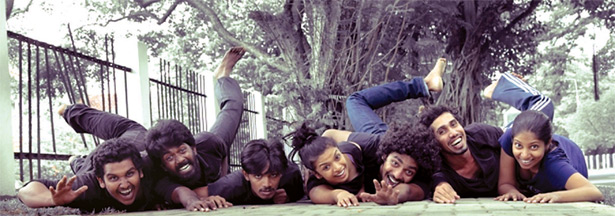 |

